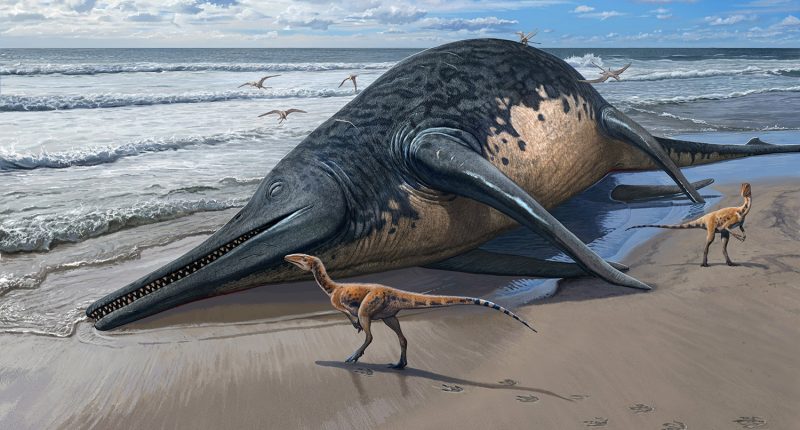FOSSILS found by an 11-year-old girl on a beach in Somerset belonged to one of the largest marine reptiles ever, experts believe.
Ruby Reynolds – now 15 – stumbled across fossilised remains of a gigantic jawbone measuring more than two metres in 2020.
She and her father, Justin Reynolds, stumbled across the piece while fossil hunting at the seaside village Blue Anchor.
Palaeontologists say the pieces are from a type of ocean-going reptile called an ichthyosaur and estimate it was around 25 metres in length, the size of two buses.
It was so cool to discover part of this gigantic ichthyosaur. I am very proud to have played a part in a scientific discovery like this
Ruby Reynolds
That’s also about as long as a blue whale, which would make it among the largest marine reptiles ever recorded.
The prehistoric creature roamed the seas around 202million years ago in the age of the dinosaur.
Read about dinosaurs
Another piece was previously found by fossil hunter Paul de la Salle in 2016 along the Somerset coast at Lilstock which was already being studied.
“When Ruby and I found the first two pieces we were very excited as we realised that this was something important and unusual,” Mr Reynolds said.
“When I found the back part of the jaw, I was thrilled because that is one of the defining parts of Paul’s earlier discovery.”
Ruby, added: “It was so cool to discover part of this gigantic ichthyosaur. I am very proud to have played a part in a scientific discovery like this.”
Most read in Science
The pair contacted Dr Dean Lomax, a palaeontologist at The University of Manchester, after finding the haul of fossils.
Experts have named the creature Ichthyotitan severnensis, which means giant fish lizard of the Severn.
Dr Lomax, said: “I was amazed by the find. In 2018, my team (including Paul de la Salle) studied and described Paul’s giant jawbone and we had hoped that one day another would come to light.
“This new specimen is more complete, better preserved, and shows that we now have two of these giant bones – called a surangular – that have a unique shape and structure.
“I became very excited, to say the least.”
He added: “I was highly impressed that Ruby and Justin correctly identified the discovery as another enormous jawbone from an ichthyosaur.
“They recognised that it matched the one we described in 2018. I asked them whether they would like to join my team to study and describe this fossil, including naming it.
“They jumped at the chance. For Ruby, especially, she is now a published scientist who not only found but also helped to name a type of gigantic prehistoric reptile.
READ MORE SUN STORIES
“There are probably not many 15-year-olds who can say that. A Mary Anning in the making, perhaps.”
The new research is published in the journal Plos One.
Why did the dinosaurs die out?

Here’s what you need to know…
- The dinosaur wipe-out was a sudden mass extinction event on Earth
- It wiped out roughly three-quarters of our planet’s plant and animal species around 66million years ago
- This event marked the end of the Cretaceous period, and opened the Cenozoic Era, which we’re still in today
- Scientists generally believe that a massive comet or asteroid around 9 miles wide crashed into Earth, devastating the planet
- This impact is said to have sparked a lingering “impact winter”, severely harming plant life and the food chain that relied on it
- More recent research suggests that this impact “ignited” major volcanic activity, which also led to the wiping-out of life
- Some research has suggested that dinosaur numbers were already declining due to climate changes at the time
- But a study published in March 2019 claims that dinosaurs were likely “thriving” before the extinction event











